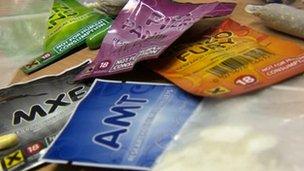LSD substitute NBOMe should be class-A, advisers say
- Published

So-called legal highs are sold in head shops and online
Two party drugs subject to temporary bans should be made permanently illegal, government advisers have said.
The Advisory Council on the Misuse of Drugs (ACMD) recommended the hallucinogenic NBOMe should be made a class-A substance, while the ecstasy-like BenzoFury should become a class-B.
Both the previously legal highs were banned for a year in June.
The government said it would "respond in due course", while campaigners questioned the effectiveness of a ban.
'Serious health damage'
NBOMe, also known as N-Bomb, is a powerful hallucinogen which causes euphoria but can also lead users to feel nauseous and panicky.
It is a club drug taken in powder or blotter form and is described as an alternative to LSD.
If NBOMe is reclassified as a class-A drug, dealers could face up to life in prison, while possession would be punishable by a jail sentence of seven years.
The ACMD said both substances had been "linked to a series of hospital admissions and a small number of deaths".
"People should be under no illusion, these substances marketed as so-called 'legal highs' can cause serious damage to your health," said ACMD chairman Professor Les Iversen.
"People using these substances are experimenting on themselves, leaving them at risk of overdose and without knowing what the long-term effects could be."
The advisory group said the drugs appeared to have arrived "via a well-established link" to producers in China.
'Pace of change'
Because only small amounts of the powder can generate large amounts of the drug - up to 20 million doses from 1kg - it is "potentially highly profitable", according to the ACMD's evidence, external.
Crime prevention minster Norman Baker said: "I am grateful to the ACMD for its advice on BenzoFury and NBOMe and we will respond in due course."
But charity DrugScope said a ban on its own would not be the answer.
"The pace of change on the drug scene is such that we cannot rely on the Misuse of Drugs Act and enforcement alone to comprehensively tackle the issue of legal highs," communications director Harry Shapiro said.
Mr Baker told Parliament in October that in some cases "so-called legal highs are more dangerous" than those currently banned.
The UK has the largest market for psychoactive substances in the European Union, according to a recent United Nations report.
- Published16 October 2013
- Published4 June 2013
- Published26 June 2013